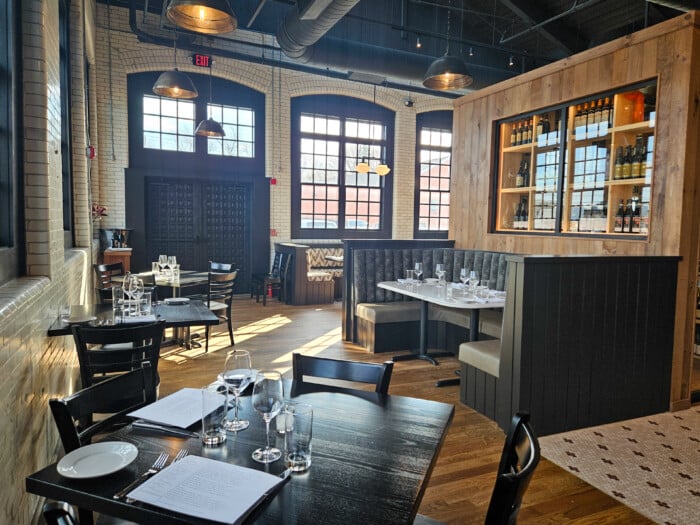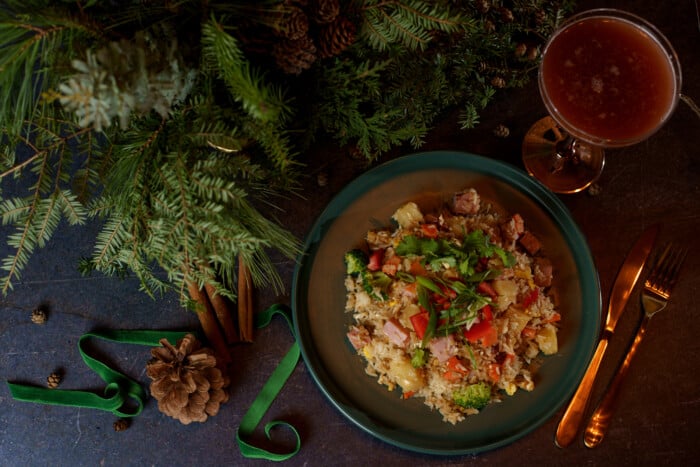Stanley Arnoldo Orantes and Jaime Lopez Bring Authentic Latin American Fare to Exeter
Ambrose Restaurant executive chef and co-owner Stanley Arnoldo Orantes held out a selection of small, bright yellow-green, as-yet-unopened flower buds, each uniformly resembling an elegant diamond shape.
These aromatic, edible buds, which hold tiny white flower petals inside, have a scent that Orantes and co-owner struggled to accurately describe.
That mystery is part of the concept of Ambrose, co-owner Jaime Lopez says.
“Many of our dishes have that ethnic ingredient that is going to give them that ‘wow’ factor, that guests will enquire about,” Lopez says.
Lopez and Orantes only met a couple of years ago, and both came to America through very different channels. Lopez, who was raised between the U.S. and Jalisco, Mexico, served for six years onboard a submarine in the U.S. Navy. After rounding the North Pole, Lopez ended his tour in Portsmouth and stayed here. Graduating with a business degree specializing in hospitality from the Whittemore School of Business and Economics, Lopez got to work finding a compatible team for his future restaurant.
Orantes, originally from El Salvador, had studied international marketing before moving to Boston about 10 years ago. The chef gained extensive experience in several facets of the fine dining and casual restaurant businesses, working at Ostra, Cultivar and Ecco.
When their paths met through a mutual friend, they found that their visions aligned — they both wanted to open their own restaurant.
“After many conversations, we thought maybe it’s worth giving it a shot. After much research, we decided on opening a tapas-style dining restaurant (in Ambrose),” Lopez says.
“This is my passion,” Orantes says.
For the building, Lopez and Orantes settled on Inn by the Bandstand, the 1809 mansion directly across from its iconic namesake in downtown Exeter. Besides containing Ambrose, the Inn by the Bandstand includes a boutique hotel that has been restored in a Federal style.
Off the main entrance, fewer than a dozen tables sit cozily inside the main dining room, which has a fireplace. Opposite the dining room is a quiet sitting room for guests. Additional tables are out back on the new, flower-lined, three-season patio. Though it’s just steps from Exeter’s busy shops and coffee houses, the patio remains quiet, the downtown buzz replaced by a breeze and the sound of trickling water.
For Ambrose’s menu, Orantes gathers locally sourced ingredients from producers in Exeter and around New Hampshire. He also keeps the food at Ambrose as homemade as possible, with nearly everything made in-house.
“We live in New England. We live in New Hampshire. We live in Exeter specifically. And we rely on local producers. That provides another element of freshness to the table,” Lopez says.
But to incorporate those authentic ingredients from El Salvador and other parts of Latin America, Orantes often makes trips to the Latin markets in Boston.
“In Massachusetts, you just have more ethnicities, more ethnic foods, more of everything, so it’s easier for us to get the ingredients we need there,” Lopez says.
Orantes searches specifically for three ingredients, among them the loroco. Native to Central America, loroco is available from late spring to early fall and are known as Quilite to some indigenous groups.
“It’s like nothing you’ve ever had in your life; it’s very different,” Lopez says.
The blossoms are often used in pupusas, a cornflour-based flatbread or tortilla made in El Salvador and Honduras that is filled with meat, beans or cheese, chicharron (a pork preparation) or curdito — cabbage prepared with vinegar, salt and oregano. Sometimes served with beans and rice, the pupusa is El Salvador’s national dish.
For Ambrose’s version of pupusa, Orantes uses the fragrant buds for the loroco de crema, which is served over risotto. The dish is presented in a covered pot. As the cover is lifted, the aromas are released for guests to experience.

Jaime Lopez is the business manager and a partner of The Ambrose at the Inn at the Bandstand in Exeter.
“It’s a strong, pleasant, dominant flavor in the dining room when you open the lid. That’s one of our most popular dishes, because it features an ethnic ingredient. The aromas come to the table in such a way that it’s like, ‘Wow, what is that?’” Lopez says.
“I think this is the more representative tasting food in my country,” Orantes agrees.
The other two ethnic ingredients Orantes sources in Boston to provide that “wow” factor include relajo — a spice mix with varying ingredients, including pumpkin and sesame seeds, bay leaves, chiles, cumin seeds, achiote — and panela, unrefined whole cane sugar found in Latin and Central America that is used to make dulce de panela, a versatile dish.
“The dulce de panela is a very artisanal, unique product,” Orantes says.
During celebrations, it’s served alongside torrejas, bread that’s prepared with egg white foam and cinnamon, similar to French toast. It’s also served with chilate, an artisanal drink made with cocoa, rice, cinnamon and sugar. The nonsweet flavor of the chilate balances out the sweetness of the cane sugar and torrejas.
Dulce de panela is used with yet another signature dish on their menu, “pollo en chicha.” In El Salvador, it’s made using rooster and is reserved for special occasions, but here it’s roast chicken. The menu rotates seasonally.
Since opening in June 2021, Ambrose Restaurant has been very well received, Lopez and Orantes say.
“We’re getting more and more popular. People are calling,” Lopez says.
The restaurant’s patio space is also well liked.
“During the summertime, many people don’t want to be indoors because they’re New Englanders, and they like to be outside,” Lopez says. “You hear the fountain. You hear other people having fun. It’s quite secluded.”
This article is featured in the winter 2023 issue of 603 Diversity.
603 Diversity’s mission is to educate readers of all backgrounds about the exciting accomplishments and cultural contributions of the state’s diverse communities, as well as the challenges faced and support needed by those communities to continue to grow and thrive in the Granite State.














